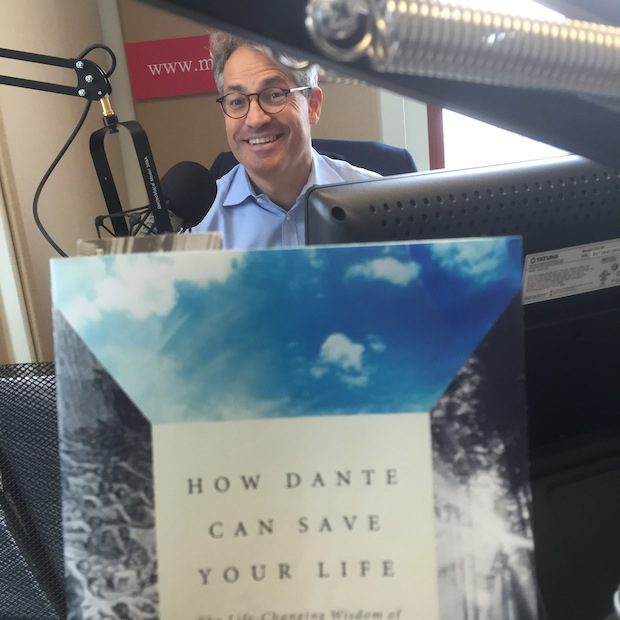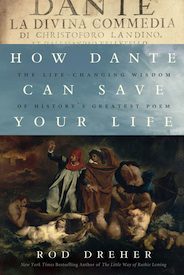Read How Dante, Change Your Life

I was delighted to see this extraordinarily generous review of How Dante Can Save Your Life posted to Amazon. The author is Charles Lewis, the former religion writer for Canada’s National Post:
Do not walk to get this book, but run. There is so much packed in there yet it is written in the most accessible of styles. The true gift of a great non-fiction writer it to write with a light hand and yet not in any way dumb down. I have to say that if you’ve never read Dante’s The Divine Comedy it really doesn’t matter. You will likely want to after reading this, but if you haven’t, don’t let it stop you from reading Dreher.
Some may be put off by what looks like a self-help book, but those who do are cheating themselves. It’s hard to summarize and to do it justice but I’ll give it a try. Mr. Dreher, like any adult with any real living under their belts, has had his share of sorrow and pain. But he’s not whining or complaining but stating in such a way that most, like I did, will nod their head in recognition. He does it with grace and courage with no sense of self-pity.
But he wanted to get past those things that were weighing him down and threatening despair. It’s about how to forgive, to live with things that couldn’t be changed, the need to ask for help at times and of course, dealing with what is often our greatest source of confusion and anxiety, family. He figures out that in Dante there are the same universal themes but with a “map” on how to move forward. (BTW: He states from the beginning he was never a fan of poetry.) I’ve only known Mr. Dreher through phone and email messages when we were both newspaper reporters. I began following his writings and always thought he was a man of rare integrity – a quality hard to find in our “me, me, me” culture. Finally there is much about his book and Dante’s work that is Catholic yet you can be certain you could be an atheist and still learn much from from Dreher and Dante. I wish this book ever success because it deserves to be read and I believe it will change lives.
He’s wrong about my character, but right, I think, about the book. I run in to people who say that they are not going to read my book because they don’t think Dante is something that would interest them, or that they would ever read. I say, “Don’t let that stop you.” How Dante is not a literary guide, but rather a story about how my interacting with this extraordinary poem took me on an inner journey that resulted in slaying some dragons that had vexed me all my life, and finding a way to genuine spiritual renewal, and physical healing. I wrote the book for the same reason Dante said that he wrote the Commedia: to bring people from a state of misery to a state of happiness. This is a book that’s about both contemplation and action.
This passage from How Dante gives you an idea of how the book works. In it, I’m facing the lessons taught by the pilgrim Dante’s sojourn in Inferno, in the circles of the Hoarders and Wasters (that is, those who were miserly and those who were spendthrift):
We were not particularly tied to money or possessions, but love and loyalty were the currency within my family system—and there Dante’s insights hit home. None of us knew how to manage our love for each other. I thought they were hoarders who would only share love if they could have their own way, and squanderers of the opportunity Ruthie’s tragic death gave us for reconciliation. In my view, they were willing to let the treasury of love drain away out of pride.
They must have thought me a hoarder for leaving Louisiana in the first place, keeping myself from them all these years to pursue what they saw as the false values of worldly success. And they must have seen me as a squanderer for coming home and wasting these days in worry and bitterness.
It occurred to me that the idea of all of us living in harmony in one place was our family’s golden calf—the idol around which we all had danced for as long as any of us could remember.
Later that evening, making supper with Julie in the kitchen, I told her about my Dante reading, and how the poem was forcing me to think about the intractable situation with my family in new and unsettling ways.
“It would be so much easier if they were all just bad,” I said. “But it’s not true.” The canto about greed had made me think about how generous Ruthie was, I said.
“You can’t lose sight of that,” Julie replied.
“Yeah, but the double vision is so hard for me to pull off,” I said. “I feel like if I only focus on the good, I’m whitewashing the bad.”
As I would discover the further I went into the Commedia, Dante’s gift for showing how the virtues of some of his poem’s greatest sinners are inseparable from their vices helped me to make sense of the nuances in my own situation – and in my own divided heart.
“Can I say something good here?” Julie said that night. “It makes me happy to see you get so excited about fiction, for a change.”
“It’s weird, isn’t it?” I told her. “I could be reading all of this in a book of philosophy, but it wouldn’t have the same effect. Dante is getting inside me and messing with my head.”
“That’s not a bad thing, is it?” my wife said.
“No, not at all,” I said. “It’s just that it kind of feels like this book is taking over.”
Dante’s Divine Comedy is about life and how to live it. How Dante Can Save Your Life is about how the poet and his miraculous poem taught me this — and how it can do the same for you, the ordinary reader who (like me) would never thought to have cracked the cover of the Commedia, believing its contents to be esoteric and inaccessible. How wrong I was. Learn from my mistake, and find new life. Thanks, Charlie Lewis, for your kind words. You’ve seen exactly what I am trying to do with this book.


Subscribe for as little as $5/mo to start commenting on Rod’s blog.